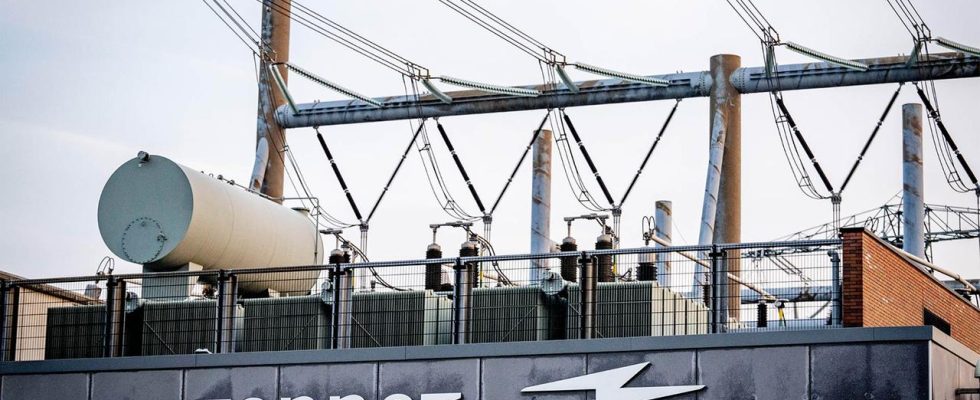faq
The federal government is reaching out to the electricity grid operator TenneT. Is the state network company coming now? And what consequences would the whole thing have for taxpayers and consumers?
Since when has the federal government been interested in TenneT?
The federal government has been conducting intensive negotiations with the Dutch transmission system operator TenneT since autumn 2022. The aim is to purchase large parts of the German electricity network from TenneT.
According to insiders, the federal government is now almost there: an agreement may only be a matter of days. The deal would be processed through the state-owned KfW. But the talks could still fail. The federal government itself is keeping a low profile. “We don’t have a new status,” said a spokesman for the Federal Ministry of Economics in Berlin today. There is no agreement.
Who is behind TenneT?
The Dutch TenneT group, which is 100 percent state-owned, is one of the largest European operators of high-voltage lines – the so-called “electricity highways”. In Germany alone, TenneT has a network that is more than 10,000 kilometers long.
What is TenneT doing in Germany?
These lines were originally owned by the Düsseldorf energy company E.ON. However, the EU Commission had called for the separation because it suspected the energy giant of having driven up electricity prices in Germany by exploiting its market power. In 2010, the E.ON networks were sold to the TenneT Group.
Why is the federal government interested in TenneT?
The German TenneT network is of immense importance for the implementation of the energy transition, as TenneT operates the important north-south electricity highways.
In order to achieve climate neutrality by 2045, the north-south route urgently needs to be expanded and modernized. The aim is to bring electricity from offshore wind turbines in the North Sea to industrial sites in the south. The groundbreaking ceremony for the SuedLink route took place in autumn 2023.
TenneT and TransnetBW have divided the entire project horizontally near Hildesheim in Lower Saxony. TenneT is responsible for the northern section of the route and the converters in Schleswig-Holstein and Bavaria.
By purchasing the TenneT network, the federal government could have a much greater influence on network expansion. In addition, Germany would regain control over this critical domestic infrastructure. In this respect, state control would also be a protection against unwanted investors.
What interest do the Dutch have in the deal?
TenneT itself has a great interest in selling its German electricity network. The Dutch themselves initiated the sale because they are simply not prepared to help finance the German energy transition.
The investment requirement in the German TenneT network is enormous; experts speak of around 100 billion euros that will be needed over the next ten years to switch to renewable energies.
How much would a purchase cost?
The German TenneT network does not yet have an official price tag, and neither the federal government nor TenneT have commented on it. However, experts estimate the value of TenneT’s German business at 20 to 25 billion euros.
The money for the purchase will flow through the state-run Loan Agency for Reconstruction (KfW). In addition, there would be around 100 billion euros in investment costs for the energy transition in the coming years.
Does the climate fund ruling prevent the purchase?
Not necessarily; The federal government’s purchasing decision is certainly made more difficult by the Federal Constitutional Court’s ruling on the climate fund last year. Afterwards, 60 billion euros will be blocked from the climate fund.
Despite the court ruling, the federal government is sticking to its plan, as a spokesman for the Federal Ministry of Economics emphasized in November in response to the ruling.
Is the federal government also interested in other network operators?
In fact, TenneT is not the only network operator that has been targeted by the federal government. In 2018, the federal government acquired a fifth of the East German network operator 50Hertz through KfW – thereby preventing a Chinese company from entering the market. The focus here was on securing critical infrastructure against foreign interests.
In addition, the federal government is considering a state entry into the electricity network operator TransnetBW, a subsidiary of the German EnBW group. The utility is pursuing controversial plans to partially privatize its networks. KfW could take over 25 percent of the shares in TransnetBW via an option.
Now comes the state one Network company?
If the federal government implements its plans for TransnetBW and TenneT, it would have a stake in three of the four major network operator companies in Germany, which are: 50 Hertz, TenneT, TransnetBW and Amprion. The federal government would thus lay the foundation for the state network company, which has been discussed for years and is extremely controversial within the traffic light coalition.
According to its supporters, this could drive grid expansion and the energy transition in Germany. However, the FDP in particular is critical of the state not only being the legislator, but also the owner and regulator of the energy market.
What consequences would one have? nationalization of the power grids for the price of electricity?
Experts are unsure about this. Actually, nationalizing the electricity grids should not have any impact on the price of electricity. Investments in the network increase network fees, which is likely to increase the price of electricity for consumers. However, the amount of these investments should not depend on the ownership structure.
In fact, nationalization should not lead to distortions of competition. After all, the electricity transmission networks are monopolies that do not compete with each other. At best, there could even be synergy gains if the four German electricity network operators were merged into one state-owned company.

